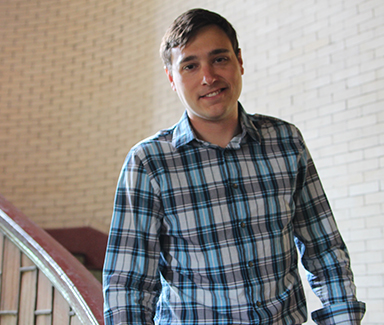First Person: The Road to My PhD
 Garrett Stack is graduating with his PhD in Rhetoric this spring. He recently wrote about the process behind discovering and completing his dissertation, "The Sierra Club and the Rhetorical Sublime."
Garrett Stack is graduating with his PhD in Rhetoric this spring. He recently wrote about the process behind discovering and completing his dissertation, "The Sierra Club and the Rhetorical Sublime."
Dissertation inspiration...
I came to Carnegie Mellon English from a rhetoric program at San Diego State University, and in that program we were required to write a thesis in fulfillment of the master’s degree. The two years I spent researching, planning, and writing my thesis, which focused on mediation of Amazonian land development, helped to give me a general plan for my dissertation work and introduced me to the field of environmental rhetoric. My two additional years of coursework here at CMU, as well as presenting at conferences and preparing for my qualifying exam, helped to refine that plan. Further digging led me to shift my focus to American wilderness preservation work and ultimately to the Sierra Club and their public rhetoric surrounding dam prevention.
Research road bumps...
Access to my corpus was difficult. Due to copyright law and the legal uncertainty surrounding digitization projects such as Google Books, many of the documents I required were available digitally but inaccessible because they were published after the public domain date (1922). This meant using interlibrary loans (ILL) for most of my resources, and as most any librarian can tell you, ILL can be inconsistent in terms of the speed with which materials are sent, the time you are granted with those materials, and the condition of the books themselves. Sometimes I would order a book and wait two weeks, only to find that I had no need of the volume because a specific article or picture I was looking for was a month off and bound in a different volume.
Triumphs en voyage...
Thanks to a combination of funding sources, including English Department funding, GuSH Research Grants, and success in the first round of the 2015 Three Minute Thesis Competition, I had enough money to travel to the Sierra Club archives housed in the Bancroft Library at University of California at Berkeley as well as to other historical sites in Yosemite Valley. It was a true pleasure to finally see my corpus gathered in one place and to have it all at my fingertips. But maybe even more useful was the to opportunity to walk the same paths of my research subjects and to see first-hand the kind of landscape that would inspire so many people to devote their lives to the cause of wilderness preservation.
The road ahead...
I will be starting a tenure-track position in the fall at Ferris State University teaching composition, rhetoric, and professional writing, and I likely could not have obtained the position without CMU on my CV. Although CMU and the English department in particular have been instrumental in my scholarly maturation, the program was most useful for professionalization as a future faculty member. Given the current job climate, most graduating PhD students are unlikely to nab a job at a top research institution. This means that it is more important than ever to get as much teaching experience as possible, as well as diversify the CV with administrative and writing center positions.
The opportunities to teach 76-100, 101, and 270 were crucial experiences for honing the skills necessary to be competitive on the market. The students are (usually) a joy to teach, and during my five years of instructing here I was able to learn that teaching was the greatest part of my desire for a faculty position. Though there are certainly issues with any institution or department, CMU English provides plenty of opportunities for professionalization if you are active and communicative about pursuing desired positions. In addition, becoming involved with organizations like the RSA chapter, the Silver Tongue, the Global Communication Center, and the Eberly Center can help provide additional opportunities beyond teaching to contextualize and enhance work in the classroom. And, most importantly, the collegiality amongst graduate student teachers in the department helped to make me a better teacher simply through association and emulation with such fine folks.
Finally, the excellent guidance of my dissertation committee was crucial for making the leap from student to faculty. My advisor, Dr. Barbara Johnstone, was invaluable not just for my dissertation but also for navigating the academic job market and learning to “talk the talk.” The opportunity to write a book chapter with Dr. Linda Flower helped improve my writing process and introduced me to scholarly collaboration. And I will sorely miss Dr. Andreea Ritivoi as a sounding board for ideas and as a fathomless resource for rhetorical knowledge. I hope they will continue to take my frantic emails for advice on down the road.